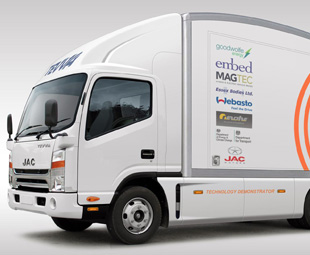Retrofit electric power in testing

Tevva Motors, which is based in the United Kingdom (UK), has developed an environmentally friendly, electric range-extender powertrain that can be fitted to a 7,5-t truck, either as a retrofit package, or on the production line.
Currently being tested on UK roads with three separate vehicles – one of which is in daily use with logistics operator UPS – the electric, range-extended drivetrain has the ability to reduce and avoid producing emissions, thanks entirely to Tevva’s intelligent predictive software.
The drivetrain consists of a single 120 kW electric motor, capable of producing 1 800 Nm from zero revs, powered by 66 kWh batteries that have a service life of up to ten years. A small-capacity diesel engine generates additional charge while on the move.
When the range extender is in use, greenhouse gas emissions are 80 percent lower than an average 7,5-t diesel truck. Otherwise, it takes no more than three hours to charge the batteries using three-phase, 32-amp supply.
The vehicle’s battery range is 160 km, while the range extender allows 400 km with a 40-litre fuel tank and 600 km with a 75-litre tank.
The complete drivetrain is controlled by Tevva’s patent-pending Predictive Range Extender Management System (PREMS), which enables the most efficient use of the electric range-extended drivetrain without input from the driver.
Using GPS navigation, together with real-time nitrogen oxide (NOx) and air quality data, the vehicle knows when to use the range extender – such as during high-discharge situations on motorways – and when not to use it – such as in urban areas like town or cities, where there is poor air quality.
Asher Bennett, Tevva Motors CEO, says: “Tevva’s electric range-extender technology removes the operational risk created by pure electric vehicles, allowing unlimited operational range, but, typically, using electric power on most operations.
“Our proprietary technology enables smart use of the range extender; fleets get the maximum use from the battery power, delivering full low-emission benefits and cost savings.”
Published by
Focus on Transport
focusmagsa




 Big news from FOCUS on Transport + Logist
Big news from FOCUS on Transport + Logist


 !
Starting 1 April, every
!
Starting 1 April, every


 FUSO: Driving the Future of Mobile Healthc
FUSO: Driving the Future of Mobile Healthc



 A brand
A brand




 Wondering about the maximum legal load for a
Wondering about the maximum legal load for a 
 The MAN hTGX powered by a hydrogen combus
The MAN hTGX powered by a hydrogen combus

 Exciting News for South African Operators
Exciting News for South African Operators


